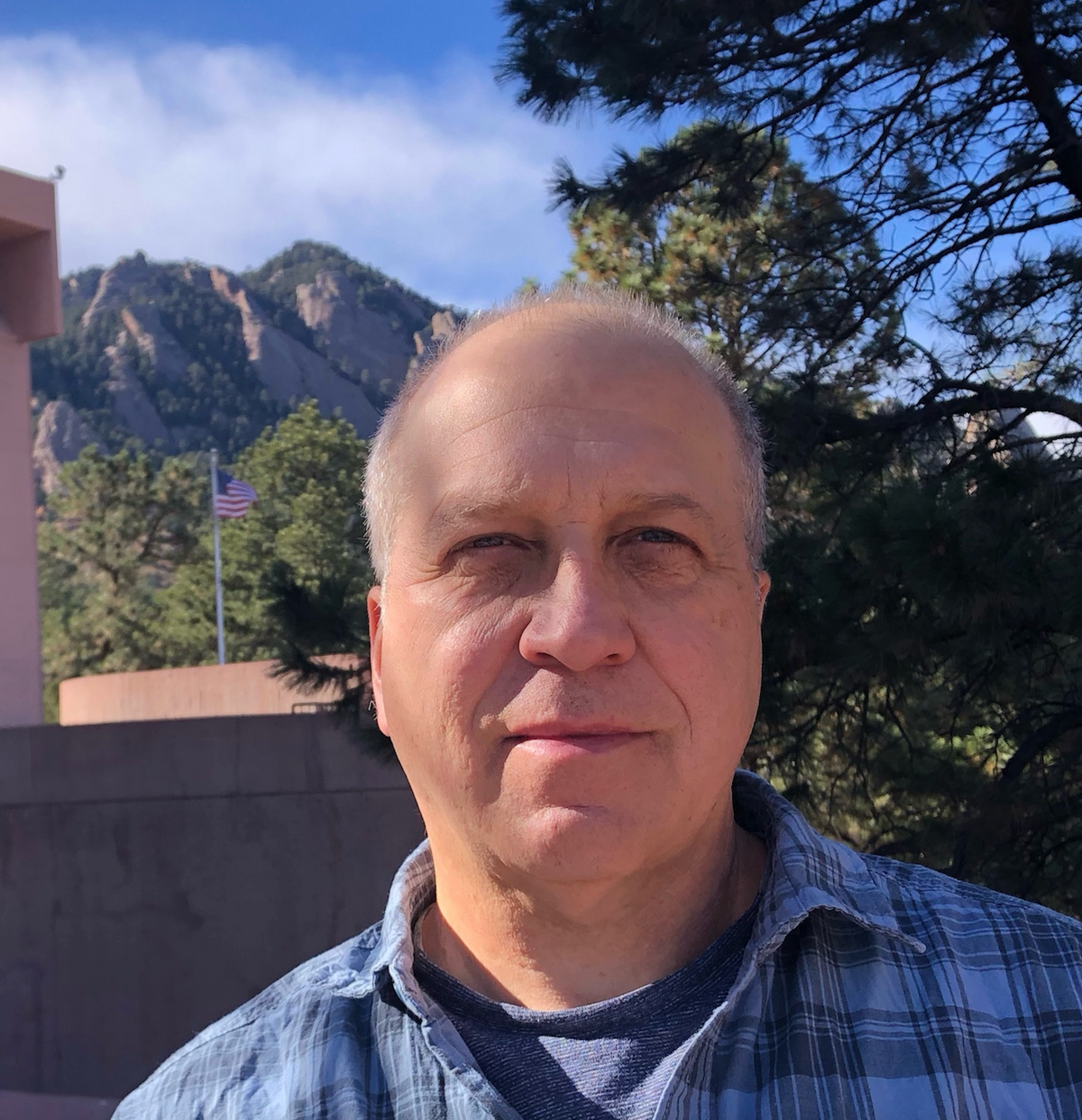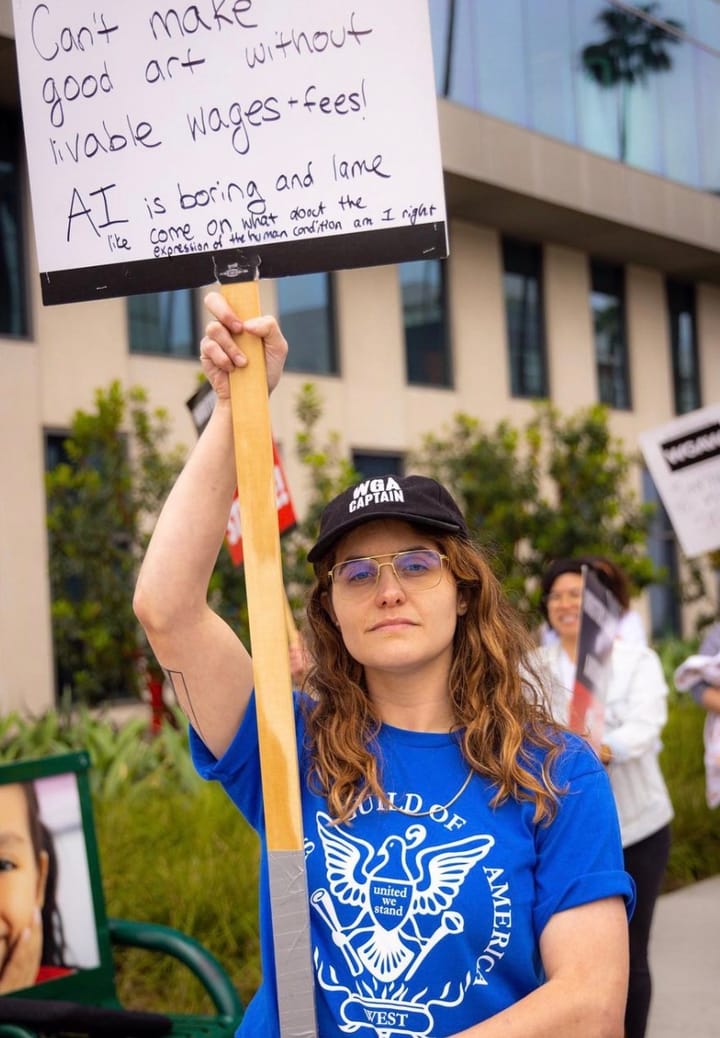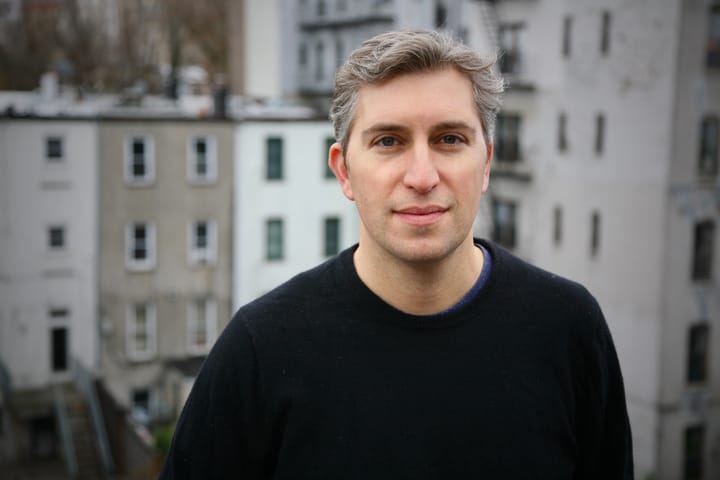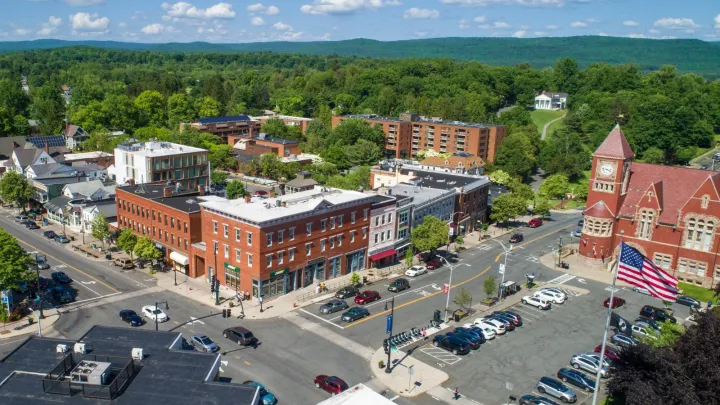Modeling Water for the Planet’s Future — Alumni Profile, Andy Wood ’88
From research that shapes public policy, to mentoring postdocs, to forecasting climate change, Andy Wood ’88 is a truly great scientist.

I went to high school in Piscataway, New Jersey, at a public school with a much higher enrollment than Amherst’s — and with a very different composition of students, teachers, curricula, and opportunities for students.
My teachers always told me that I was a pretty good writer, so I liked my English classes, but I have also felt a very quantitative connection with the world for my entire life. Plus, my father said I would be a good scientist. The flexibility of Amherst’s curriculum and the opportunities across disciplines that the college offers were therefore attractive to me even as the school’s promises felt impossible (not to mention unachievable). Even now, I feel stuck whenever I think about what I might want to do after all this education stuff: My interests are still disparate, and I’m still terrified that I’ll choose wrong, or worse, that I’ll only realize my mistake long after graduation.
As a result, Andy Wood’s ’88 name on the shortlist of alumni The Student chose to profile for this year’s Homecoming issue felt somewhat pointed at me.
Wood is a project scientist at the National Center for Atmospheric Research (NCAR), and will soon be splitting time between that job and a research professorship at the Colorado School of Mines. His work is in hydrology, or the study of water, especially water on and underneath the earth’s surface and in the atmosphere. He has contributed to international efforts to fight climate change both by leading the development of systems to evaluate and predict worldwide hydrologic data, and by organizing national and international conferences and workshops on climate prediction and applications of that work. He has edited the American Meteorological Society’s Hydrometeorology Journal, mentored dozens of students, and co-authored an astounding number of papers.
In short, Wood is an absurdly accomplished scientist whose work has had a direct hand in shaping the tools used across the nation and the world to quantify the effects of climate change. But here’s the thing: He graduated from Amherst as an English major.
As a probable English major currently taking a class called “Hydrogeology,” I felt that just the simple facts of Wood’s life would make for a fascinating interview that was relevant to me. However, it was clear from just the first minutes of our conversation that my initial assumption was a vast understatement.
“Water” You Going To Study?
Reflecting on his time at Amherst, Wood said, “I didn’t have a strong feeling of a major … I was always a very good writer — at least that’s what I’d been told, you know, by my teachers and things like that. So [an English major] was always an option, but I took a big smattering of courses.”
Sound familiar? I could hardly believe my ears. Here was an Amherst graduate from a city public school in St. Louis, who had never stepped foot on campus before attending, and who only applied because he was impressed with the vision of the college presented by a visiting admissions representative.
Once he got to campus, moreover, the resonances between Wood’s academic journey and my own didn’t stop. Always a quantitative person, Wood took math and chemistry classes alongside political science and, of course, his English credits. He studied abroad at St. Andrews in Scotland and took psychology and philosophy there while also continuing with literature, and, upon coming back to campus, found himself nearing graduation with enough classes to grant him an English degree. And so an English major he became. But, in a fateful moment, it was during that same senior year when Wood took his first geology class — an experience that led him to apply for a fellowship in the geological sciences as soon as he graduated. He got the fellowship, but because it didn’t turn out to include very much coursework, he turned it down.
After college, Wood pursued a number of small jobs, from carpentry, to local construction, to bartending, and eventually a teaching position in language arts at Landmark School, a boarding school for dyslexic students in Beverley, Massachusetts. “But as I was [teaching], I thought very strongly about getting away from that kind of a career and more toward a science career,” Wood said. “I actually was quite envious of the teachers who were teaching things like, you know, biology or environmental science.”
A Shift in Focus
Finding myself in a position after graduation of wanting to the point of envy to do something different from what I’m doing is one of the central nightmares of my college experience. Wood, though, never resigned himself to eternally envying his peers.
Instead, he left Massachusetts. He would eventually move to Seattle with plans to enroll in a civil engineering program at the University of Washington, but he also took time to travel. During the time between leaving Massachusetts and his return to school, Wood lived not only in Seattle but also in Quito and elsewhere in Ecuador and Colombia. There, Wood said, he would “experience water outages and power outages during the day” unlike anything he had experienced in the U.S. He lived with a family “where the mother would have to go out and carry back a huge pail of water to be used each afternoon,” reflecting a basic difference in water infrastructure across countries. During this time, Wood’s firsthand experience of the importance of water infrastructure and the consequences of poor management in the U.S. and in South America began to combine with his nascent interest in earth science and his desire for further education.
Wood’s Seattle roommate was already attending graduate school in the field of quantitative economics, using advanced mathematical models to try to improve fisheries. “That led me to start thinking about how those more sophisticated techniques [and models] are being used in things like water management,” Wood explained, “and I ended up going into civil engineering.” He ended up with a Master of Science in Engineering (M.S.E.) from the Department of Civil and Environmental Engineering at the University of Washington, focusing on water resource systems and climate change in the Savannah River system.
With his M.S.E., Wood ended up working with the U.S. Corps of Engineers in Washington D.C. — the largest federal manager of water in the U.S. There he worked in the policy and the Special Studies divisions at the Institute for Water Resources, where some of the reports he did brought him in contact with the individuals who made policy related to the things Wood cared about.
For instance, after Wood completed a study regarding a lake in the Upper Midwest that had unexplainably fluctuating water levels which threatened the infrastructure of a nearby town, he told me, “I briefed the congressional designation and the [U.S.] Senator from North Dakota … I was still pretty young then, and I saw all these levels at which our infrastructure and policy over water and climate is being managed, so that was really very eye opening.”
After two years in D.C., Woods decided to once again go back to school. “In part,” he explained, “that’s a function of living in a place like Washington, D.C., where many people working for government and for various organizations all have doctorates.” At the time, he observed that “these people were forming policy, were very young, and had advanced degrees. So I thought I should probably keep going in my education.”
Wood obtained a Ph.D. in hydrology and water resources back at the University of Washington, and continued his work on the impacts of climate change on hydrology, from surface water to snow to drought. He also got into forecasting, the science of predicting weather and climate events in the future.
Following his dissertation, Wood says he stayed at the university for about four years to run research on “building forecasting systems for the Western U.S., predicting reservoir inflows and floods, and trying to use climate forecasts to do better prediction.”
This began another period of wandering in Wood’s life, though this one was far more productive than the last: Wood taught a few courses and mentored graduate students and postdoctoral fellows before leaving the university to join a friend’s company for two years in downtown Seattle, which he said “was focusing on renewable energy assessment forecasting.” Wood became their chief scientist before the firm began to turn away from assessment of hydropower in favor of wind and solar power, and Wood left while looking to either take a faculty position at Oregon State or work again for the federal government.
He ended up turning down the university job, and instead “worked for [the National Oceanic and Atmospheric Administration (NOAA)] for about three years, working in some centers to do streamflow predictions, or help manage water.” He worked for three years in Salt Lake City and in Portland, Oregon, in that managerial role, developing new scientific techniques and managing a team of forecasters.
That experience was valuable for a couple of reasons, Wood said: It allowed him to see “the guts of this federal operation to do prediction, but also [let him work] with stakeholders who manage municipal water supplies and reservoirs for fisheries, salmon, recreation, hydropower, water supply … all these objectives.”

A Career in a Time of Crisis
From policy-facing forecasting, to academic research, to private enterprise, and government water management, Wood had seen and done a huge swath of his field, and intimately understood its relations to scientific study and to everyday lives. His route was circuitous: He said that he “tried to follow the things that were interesting,” and he certainly succeeded.
Even more than that, he says he “tried to find ways to take the latest science to benefit the management that we do that is very important for society,” keeping in his practice an awareness of his research and how it relates to the most essential aspect of life on Earth. Water management is necessary, and it has also been getting more and more difficult. Human-caused, or anthropogenic, climate change has led to more extreme weather across the globe. More destructive floods and longer and more extreme droughts mean that water management is more important than ever: Climate science that deals with Earth’s water and the atmosphere is vital for understanding the details of climate change and finding tools to combat its effects.
Wood has now been working at the next stop on his path, NCAR, for 10 years. NCAR’s lab in Boulder, Colorado, is devoted to trying to build global and regional climate models that, Wood says, “can project climate out to the end of the 21st century or beyond, and really try to understand where we are right now with this climate change problem.”
The computer models Wood uses are enormously complex, with different groups working on sections of the model relating to the atmosphere, or the ocean, or sea ice. Wood has been trying to build better representations of how the program models water in and on the Earth’s surface, bringing his hydrological research “back to the climate change focus.”
There is endless work to be done, and the field is rapidly transforming due to machine learning and the advent of ever more powerful computing, which improves daily the granularity and accuracy of the models NCAR uses.
Wood also works with the World Meteorological Organization (WMO), “who are trying to develop systems to do prediction to help underdeveloped countries,” using the combined efforts of the global scientific community to integrate advancements across the world, an experience which Wood says has been one of the most rewarding parts of his career.
Throughout his career, Wood has integrated a love for academia with a drive for work connected to public policy. His experience and base of knowledge mean that he has been able to advise on federal policy,water management and modeling across the country. At the same time, he has continued to mentor students and even fund student research with various universities and grants.
Looking forward, Wood will soon split his time between his work at NCAR and a research position at the Colorado School of Mines, one of the most prestigious engineering schools in the country, in the Civil Engineering department. His English major hasn’t even been a hindrance, Wood says. After all, he now “spend[s] a lot of time writing grant proposals and papers, and mentoring students or post-docs in writing their papers.” In science, the only thing more important than the experiments themselves might be how well their results are communicated.
Throughout our conversation, Wood seemed to be exactly the kind of scientist I have idolized: one devoted to the process and specifics of their work, one who did science because they heard a calling and had no choice but to answer. Wood has learned and worked in the way he has because, I think, he fell completely in love with the doing of hydrology. It called him, and he answered, again and again. If his work can help humankind resolve the most existential of crises, then all the better.
At the end of our conversation, Wood articulated a final and culminating focus for the future of his life’s work. “In being involved in some of this work on climate change,” he said, “I really am increasingly motivated by the idea that some very alarming changes are taking place in our world. … Each year, there are results that come out from within the national centers that are fairly shocking about what could be ahead of us in the next 20 or 30 years. I could not say strongly enough that this is an important area for students and faculty and everyone to be really concerned about, [to] really be advocating to do something about.”
It is certain that anthropogenic climate change will change the lives of everyone living on the planet, now and far into the future. Wood is one of the scientists who is devoted to the understanding and forecasting of climate change, all in the service of developing ways to protect the planet from the most apocalyptic of eventualities. His story, of a scattered and winding education propelled by interest and seizing opportunity, has given me a new kind of assurance that what I am doing is okay, that my education here is not only worthwhile but will serve me well no matter what I do for all time afterward — as long as all that can be done with regards to climate change is done.
A fantastic college education, after all, is only worthwhile if there remains an Earth to use it on: a fact which will likely inform every decision I make while I remain a student, and for long afterwards.
Wood looks back on his time at Amherst with the kind of nostalgia reserved for a very special period in one’s life. Studying next to college record players in the music library, cooking off of the meal plan at Humphries — where he lived his senior year — and stargazing from the roof of the observatory are snapshots of a time spent at the college which reflects exactly on the experiences of students here right now. I can only hope that I am lucky enough to make even half as good a life out of it as Wood has.





Comments ()